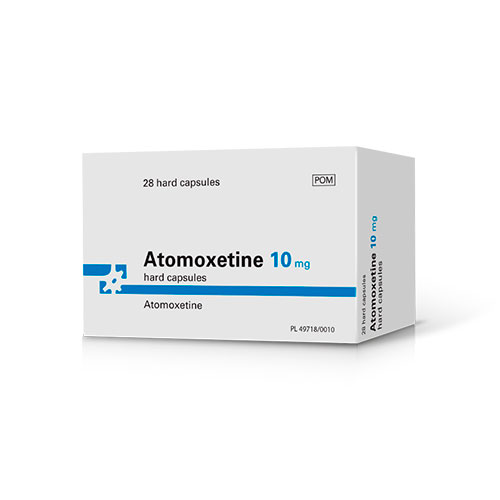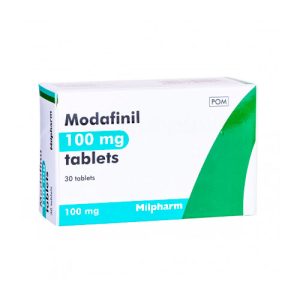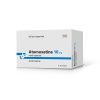Strattera
$52.00 – $132.00
Strattera (Atomoxetine) stands out as a non-stimulant medication, highly effective in managing Attention Deficit Hyperactivity Disorder (ADHD). Its unique mechanism of selectively inhibiting the reuptake of norepinephrine targets the core symptoms of ADHD: it enhances attention, reduces impulsiveness, and stabilizes emotional responses. This mode of action distinguishes Strattera from traditional stimulant medications, offering a valuable alternative for those seeking different treatment options.
Suitable for both children and adults, Strattera provides a consistent therapeutic effect throughout the day, ensuring stable symptom management. This steady delivery helps users maintain focus and productivity without the peaks and troughs associated with stimulant medications. Additionally, Strattera is particularly beneficial for individuals with co-existing anxiety disorders or those sensitive to the side effects of stimulants, as it is less likely to exacerbate such conditions.
One of the key advantages of Strattera is its safety profile. The medication has a lower potential for abuse and addiction, making it a preferred choice for long-term treatment. Its side effects are generally milder compared to those of stimulants, which enhances its usability and compliance among patients. Strattera’s well-rounded attributes make it a safer, effective, and sustainable option for managing ADHD, providing a solid foundation for improved daily functioning and quality of life.
Strattera, known generically as Atomoxetine, has emerged as a pivotal medication in the management of Attention Deficit Hyperactivity Disorder (ADHD), particularly for those seeking a non-stimulant option. Unlike typical stimulants used to treat ADHD, such as Adderall or Ritalin, Strattera works by selectively inhibiting the reuptake of norepinephrine, a neurotransmitter associated with attention and response inhibition. This unique mechanism makes it an invaluable option for patients who may experience adverse effects from stimulants or those who have a history of substance misuse, as it is not considered addictive.
The significance of choosing the right medication for ADHD cannot be overstated. Effective management of ADHD symptoms can lead to substantial improvements in daily functioning, academic performance, and interpersonal relationships. For many, Strattera provides that relief without the common pitfalls associated with other ADHD medications, such as dependency or heightened anxiety. It is crucial for patients and caregivers to understand the distinctive benefits and considerations of Strattera to make informed decisions about their healthcare options.
What is Strattera?
Understanding Strattera as an ADHD Medication
Strattera stands out in the landscape of ADHD treatments due to its non-stimulant nature, which offers a different side effect profile and action mechanism compared to traditional stimulant medications. Atomoxetine, the active ingredient, is effective in improving attention, reducing impulsivity, and fostering better overall emotional regulation. This makes Strattera particularly advantageous for patients who may have comorbid conditions such as anxiety disorders, for whom stimulants might exacerbate their symptoms.
A key benefit of Strattera is its continuous effect on symptom management. Unlike stimulants that can cause peaks and troughs in blood levels, leading to potential fluctuations in mood and effectiveness, Strattera maintains a steady state in the system, providing a consistent therapeutic effect throughout the day. This characteristic is particularly beneficial for those who need reliable symptom control across all settings—home, school, or work.
Moreover, Strattera is approved for use in both children and adults, making it a versatile option that can grow with patients as they transition from childhood through adulthood. This long-term usability is crucial for those who require ongoing management of their ADHD symptoms.
For more in-depth information on Strattera and its use in ADHD treatment, including dosage and potential interactions, visit this comprehensive resource from the Mayo Clinic. This link provides authoritative guidance and updates on the latest research findings, ensuring users and caregivers access current and reliable information.
How Strattera Can Help with ADHD
The Therapeutic Effects of Strattera
Strattera offers several therapeutic benefits that make it a preferred choice for managing ADHD symptoms. By targeting norepinephrine, Strattera helps increase attention and decrease impulsiveness and hyperactivity in patients. This is particularly beneficial for those who struggle with the traditional challenges of ADHD, such as difficulty maintaining focus on single tasks, managing time effectively, and regulating their emotional responses. Users often report a significant improvement in their ability to concentrate, which can translate into better performance in academic and professional settings.
One of the distinct aspects of how Strattera works involves its gradual impact on symptoms. Unlike stimulants that can work almost immediately, Strattera may take several weeks to achieve its full effect. However, this gradual improvement is often accompanied by a smoother experience without the abrupt highs and lows associated with stimulant medications. This can be particularly advantageous for patients seeking a more stable and predictable medication regime, helping them maintain a consistent performance throughout their daily activities.
Additionally, Strattera has been noted to improve social interactions and decrease disruptive behaviors, which can significantly enhance the quality of life for those with ADHD. By improving impulse control, it helps individuals develop better social skills and maintain more stable relationships, both personally and professionally.
Optimal Usage of Strattera
How to Take Strattera for Maximum Benefit
Taking Strattera effectively requires understanding the best ways to integrate it into daily life. It is typically administered as a single daily dose, taken in the morning with or without food. However, some individuals may experience drowsiness as a side effect; in these cases, taking Strattera at night may be beneficial. Benefits of taking Strattera at night include potentially lessening daytime drowsiness and maximizing daytime alertness and productivity.
Diet also plays a crucial role in optimizing the effectiveness of Strattera. Certain foods, especially those high in acid such as citrus fruits, can interfere with the absorption of medications. Therefore, knowing which foods to avoid while taking Strattera can help maintain the medication’s efficacy. Avoiding caffeine and excessive sugars is also recommended as these can exacerbate symptoms of ADHD and counteract the benefits of the medication.
Incorporating Strattera into one’s treatment plan should always be done under the guidance of a healthcare provider. This ensures that the dosage is appropriate and that the medication’s interactions with other prescriptions or over-the-counter drugs are carefully managed. For those on multiple medications, it’s crucial to discuss potential interactions with their doctor, as Strattera can affect the way other drugs are metabolized in the body.
To further enhance the understanding and safe use of Strattera, potential users should consider consulting additional resources such as the National Health Service (NHS) page on Strattera, which offers detailed advice on how to use the medication effectively while minimizing side effects. This resource is particularly valuable for those beginning their journey with Strattera or those looking to optimize their current treatment strategy.
Understanding Strattera’s Side Effects
Common and Rare Side Effects
While Strattera offers significant benefits for managing ADHD, it is also associated with various side effects that patients should be aware of. Common side effects include dry mouth, nausea, decreased appetite, and fatigue. These are typically mild and often resolve as the body adjusts to the medication over time. However, there are also less common but more severe side effects that require immediate attention, such as liver issues, severe mood swings, and heart-related problems, especially in patients with a pre-existing heart condition.
Patients and caregivers should monitor for signs of psychological side effects as well, such as increased anxiety, depression, or suicidal thoughts, particularly during the first few weeks of treatment or when doses are changed. Strattera side effects can vary widely from person to person, making it crucial for each individual to communicate any changes in their health or behavior to their healthcare provider promptly.
It is essential for users to not discontinue Strattera abruptly without consulting a healthcare professional, as this could lead to withdrawal symptoms or a resurgence of ADHD symptoms. Regular follow-ups with the prescribing doctor can help manage side effects effectively and adjust the treatment plan as necessary to ensure the patient’s safety and comfort.
Real-life Success Stories with Strattera
Testimonials from Users
Hearing from those who have directly experienced the benefits of Strattera can be incredibly reassuring for individuals considering this medication. Here are three testimonials from satisfied users who have seen significant improvements in their lives after starting Strattera:
Testimonial 1: The College Student’s Turnaround
“Before Strattera, my academic performance was inconsistent, and I struggled with maintaining focus in lectures. After starting Strattera, I noticed a remarkable improvement in my ability to concentrate during classes and manage my coursework more effectively. It has truly turned my college experience around, helping me achieve grades I never thought possible.” – Alex, 20
Testimonial 2: A Parent’s Relief
“As a parent, watching your child struggle with ADHD can be heart-wrenching. We decided to try Strattera on our doctor’s advice, and the change in my son has been incredible. His teachers report that he is less disruptive in class and more engaged in his studies. Strattera has not only improved his school life but our family dynamics as well.” – Maria, 47
Testimonial 3: Enhanced Professional Focus
“Working in a fast-paced office environment was challenging with my ADHD symptoms. Strattera has helped me focus my thoughts and stay on task, which has significantly improved my productivity and the quality of my work. My colleagues and supervisors have noticed the change, and I feel more confident in my professional role.” – David, 34
These testimonials underscore the potential of Strattera to significantly enhance daily functioning and quality of life for individuals with ADHD. Each story highlights different aspects of how Strattera can help manage ADHD symptoms effectively, whether in academic settings, family life, or professional environments.
H2: Comparative Analysis: Strattera vs Other ADHD Medications
H3: Strattera vs Vyvanse and Strattera vs Adderall
When choosing an ADHD medication, it’s crucial to compare the options available. Strattera, as a non-stimulant, offers unique advantages and differences when compared with stimulants like Vyvanse and Adderall.
Strattera vs Vyvanse: Vyvanse is a stimulant that can lead to dependency and has the potential for abuse, making it less suitable for patients with a history of substance misuse. Strattera, on the other hand, does not carry the same risk of addiction and is often chosen for its safer profile in long-term use. Vyvanse may act faster and have a more immediate impact on symptoms, but Strattera provides a steady, consistent effect without the peaks and troughs associated with stimulants.
Strattera vs Adderall: Adderall is well-known for its effectiveness in treating ADHD but comes with a higher risk of side effects such as sleep disturbances and appetite suppression. Strattera’s side effects are generally milder, and because it is not a stimulant, it does not cause the same level of alertness or potential insomnia, making it a better option for patients sensitive to stimulants.
This comparative analysis helps patients and healthcare providers make informed decisions based on the individual’s medical history, lifestyle, and treatment preferences.
Scientific Backing and Research on Strattera
Key Studies and Findings
Strattera’s effectiveness and safety have been supported by various clinical studies. Key research findings include its ability to improve attention, reduce impulsivity, and enhance executive function in both children and adults with ADHD. These studies demonstrate that Strattera is a viable alternative to stimulant medications, especially for patients who experience adverse effects from stimulants.
One significant study, published in the Journal of Child and Adolescent Psychopharmacology, showed that children treated with Strattera had improved scores on attention tests and parent-reported ADHD symptoms compared to those on a placebo. Another study highlighted the benefits of Strattera for adult patients, noting improvements in executive functioning and social behavior.
For those interested in exploring the scientific research on Strattera further, detailed studies and reviews can be accessed here, providing a comprehensive overview of the medication’s impact and efficacy.
Safety Information and Drug Interactions
Important Precautions and Interactions
Strattera must be used cautiously, especially in patients with existing heart conditions or those on certain antidepressants. It is known to interact with MAO inhibitors and some SSRIs, which can lead to serious side effects. Patients should always inform their healthcare providers about all medications they are taking to avoid potential interactions.
Additionally, Strattera should be used with caution in patients with severe liver impairment, as it is metabolized in the liver and may require dosage adjustments. Regular monitoring of liver enzymes may be recommended for patients on long-term Strattera treatment.
Why Choose Strattera for ADHD Treatment?
Strattera offers a non-stimulant alternative that is effective, has a lower risk of abuse, and provides consistent symptom management. It is an excellent option for individuals seeking a sustainable and less invasive treatment for ADHD. By understanding the full spectrum of its benefits and potential side effects, patients and caregivers can make a well-informed decision that aligns with their health goals and lifestyles.
Encouraging those considering Strattera to consult with healthcare providers will ensure that they receive personalized advice and support throughout their treatment journey, maximizing the potential benefits of this medication.
| Dosage | 10 mg, 18 mg, 25 mg, 40 mg |
|---|---|
| Quantity | 30 piiils, 60 pills, 90 pills |
6 reviews for Strattera
Add a review Cancel reply
You must be logged in to post a review.
Related products
ADHD




Meghan –
Lovely service and fantastic product.
Dina –
By far the best item on the market, you will not be disappointed.
Timmothy –
The item was real, arrived in perfect condition, and fast.
Selmer –
Worked fine, no problems but I’m not sure if its the best
Adela –
I received a personalized and attentive treatment. Thanks to this deal, I was able to find a solution to my problem in a short time. 🙂
Buddy –
4 stars for the product, work as described, but not as expected.